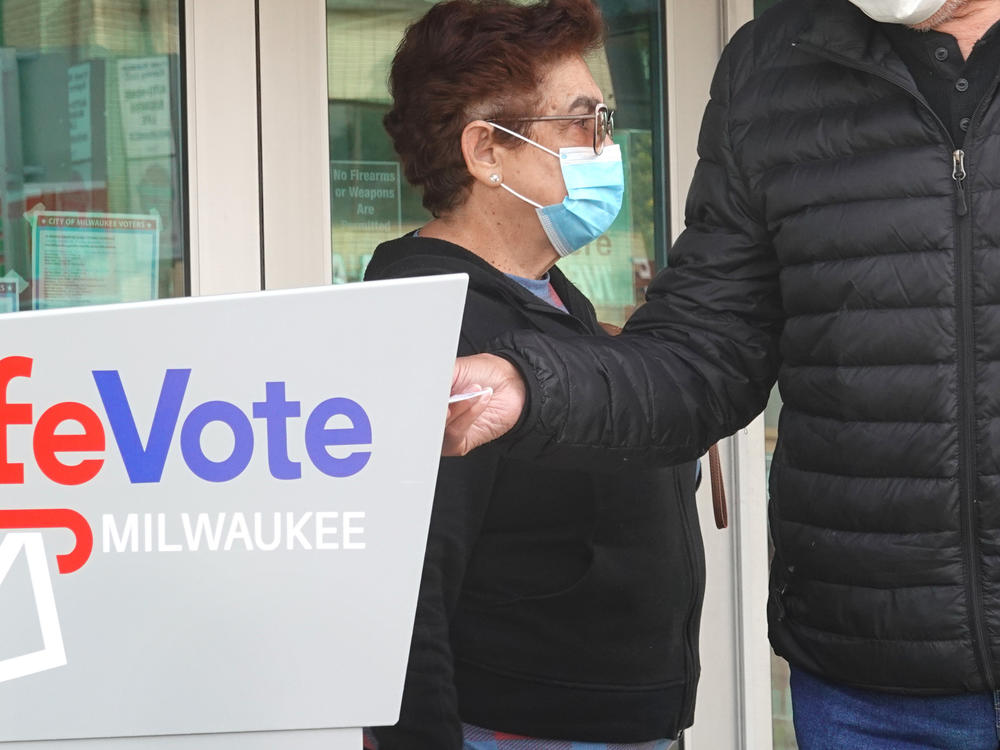Section Branding
Header Content
The Wisconsin Supreme Court says ballot drop boxes aren't allowed in the state
Primary Content
The Wisconsin Supreme Court has ruled that most ballot drop boxes aren't allowed in the state and that a voter can't have someone else return — in person — their completed absentee ballot on their behalf.
The high court's ruling Friday, which comes one month before the swing state's primary elections, is a loss for voting rights groups and disability advocates.
The decision is the latest in a legal battle that began in January, after a Waukesha County judge sided with a conservative legal group in a lawsuit, declaring state law doesn't allow for unstaffed ballot drop boxes and requires that voters physically return their own absentee ballots.
Although an appeals court temporarily blocked the order for contests in February, the ban was in effect for local elections in April.
"The key phrase is 'in person' and it must be assigned its natural meaning," wrote Justice Rebecca Bradley for the conservative majority, referring to the state statute governing ballot returns. "'In person' denotes 'bodily presence' and the concept of doing something personally."
Bradley wrote that absentee ballots must be delivered in person at a clerk's office and cannot be returned by someone else. The ruling did not address whether someone must physically put their own absentee ballot in the mailbox if voting by mail.
In a dissenting opinion, Justice Ann Walsh Bradley (no relation to her colleague) wrote that the court's decision "although lamentable, is not a surprise."
"It has seemingly taken the opportunity to make it harder to vote or to inject confusion into the process whenever it has been presented with the opportunity," she wrote. "Without justification, [the majority] fans the flames of electoral doubt that threaten our democracy."
"Applying the law as written"
All eyes were on Justice Brian Hagedorn as the case made its way through the courts. Hagedorn, who sided with the high court's conservative justices on this case, was elected with the help of the Republican Party but has sided with the court's liberal justices on several occasions.
In a concurring opinion, Hagedorn stressed that "judicial decision-making and politics are different."
"This case is about applying the law as written; that's it," he wrote.
"Significant questions remain despite our decision in this case, especially as absentee voting has become increasingly common," he wrote, adding: "The legislature and governor may wish to consider resolving some of the open questions these statutes present."
The majority's ruling rebuts guidance from the Wisconsin Election Commission.
"WEC's staff may have been trying to make voting as easy as possible during the pandemic, but whatever their motivations, WEC must follow Wisconsin statutes," Justice Rebecca Bradley wrote. "Good intentions never override the law."
Rick Esenberg — president of the Wisconsin Institute for Law and Liberty, which represented the plaintiffs in the original lawsuit — cheered the ruling.
"Wisconsin voters can have confidence that state law, not guidance from the Wisconsin Elections Commission, has the final word on how Wisconsin elections are conducted," he said in a statement.
Disability rights advocates say ruling threatens right to vote
Esenberg argued before the high court that the statute governing ballot return is explicit that only voters themselves can return their absentee ballot to the local clerk.
"I think [the court] ought to read the law as it is written, and say that the law means what it says," he said in an interview with NPR in May.
Esenberg said if people think the law is unfair, it's up to state lawmakers to change it.
But disability rights advocates have said a strict interpretation of state law leaves many voters with disabilities who rely on ballot return assistance fearful they won't be able to lawfully vote.
"We heard from people who were concerned, confused and, frankly, shocked by such an extreme restriction," Barbara Beckert of Disability Rights Wisconsin told NPR after the Waukesha County judge's ruling.
Disability Rights Wisconsin has not yet commented on Friday's decision.
Scott Thompson of Law Forward — which represented the appellants in the case, including Disability Rights Wisconsin — told NPR the initial ruling conflicted with federal protections for voters with disabilities, like the Voting Rights Act, which in part grants voters with disabilities the right to receive voting assistance from a person of their choosing, other than that person's employer or union representative.
The court's decision stands to significantly affect the upcoming elections in the swing state, where about 2 million residents voted by absentee in the 2020 general election, a record number.
According to the Wisconsin Elections Commission, there were 570 absentee ballot drop boxes being used across the state by last spring.
Copyright 2022 NPR. To see more, visit https://www.npr.org.

